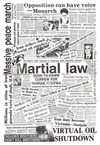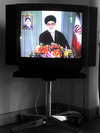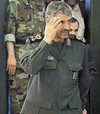Weekend Headlines
07 Feb 2010 18:27No Comments
Press Roundup provides a selected summary of news from the Iranian press, and excerpts where the source is in English. The link to the news organization or blog is provided at the top of each item. Tehran Bureau has not verified these stories and does not vouch for their accuracy. Please refer to the Media Guide to help put the story in perspective.
Iran makes new uranium enrichment challenge
BBC | Feb. 7, 2010
Iran's President Mahmoud Ahmadinejad has asked the country's nuclear chief to begin enriching uranium to 20%.
The move comes amid a worsening stand-off over a Western offer for Iran to swap enriched uranium for nuclear fuel.
The West fears Iran is trying to develop nuclear weapons - and have threatened new sanctions. Iran insists its program is peaceful.
The US defense secretary urged the world to "stand together," saying there was still time for sanctions to work.
In London, the Foreign Office said Mr Ahmadinejad's announcement was "clearly a matter of serious concern".
"This would be a deliberate breach of five UNSCRs [United Nations Security Council Resolutions]," it said in a statement.
Mr Ahmadinejad made the announcement on Iranian state television - two days after his foreign minister said a deal on swapping enriched uranium for nuclear fuel was close - a claim greeted with skepticism by Western powers.
"I had said let us give them [Western powers] two to three months, and if they don't agree, we would start ourselves," Mr Ahmadinejad said in a speech broadcast live.
Defense secretary Robert M. Gates skeptical of Iran's claims about nuclear deal
Washington Post | Feb. 7, 2010
Defense Secretary Robert M. Gates on Saturday played down assertions by Iran that it is ready to reach a deal on its nuclear program, saying Tehran's overall response to overtures from the Obama administration has been "quite disappointing."
His statement came three days after President Mahmoud Ahmadinejad signaled that Iran was prepared to accept a deal offered by the five permanent members of the U.N. Security Council and Germany, under which Tehran would hand over a stockpile of uranium for processing outside the country.
In exchange, Iran would receive enriched fuel that would enable it to power a reactor for medical research but not make bombs.
During a visit to the Turkish capital, Ankara, Gates did not completely dismiss the Iranian statements but expressed skepticism about Tehran's sincerity.
"The reality is that they have done nothing to reassure the international community that they are prepared to . . . stop their progress toward making a nuclear weapon," Gates said.
Stark reality: Impose sanctions on Iran or attack - U.S. senator Joe Lieberman
San Francisco Sentinel | Feb. 7, 2010
The world faces a stark choice between imposing tough sanctions on Iran to stop its nuclear program, or attacking it, United States Senator Joe Lieberman said Saturday.
Lieberman is the influential chairman of the Senate committee on homeland security. He was speaking a day after Iranian Foreign Minister Manouchehr Mottaki said that his country was ready to accept an international swap of uranium, but only under certain conditions.
"We have a choice here: to go to tough economic sanctions to make diplomacy work or we will face the prospect of military action against Iran," Lieberman told the annual Munich Security Conference.
Top U.S. commanders are already working out how such a strike should be conducted, and although "no one wants this to happen ... unless we together act strongly and do more than talk, that is exactly what will happen," Lieberman said.
A nuclear-armed Iran would provoke chaos in the Middle East, send world oil prices soaring and end any hope of a peaceful solution to the Israeli-Palestinian conflict, Lieberman said.
Iran leader says Israel's destruction 'imminent'
AFP | Feb. 7, 2010
Supreme leader Ayatollah Ali Khamenei said on Sunday the destruction of Iran's arch-foe Israel was "imminent," and called for continued resistance against the Jewish state, state media reported.
"I am very optimistic about the future of Palestine and believe Israel is on the steep path of decline and deterioration," Khamenei told Ramadan Abdullah, the secretary general of Palestinian militant group Islamic Jihad.
"God willing, its destruction will be imminent," the Islamic Republic's all-powerful leader said. "Continued resistance and hope for victory should be taken into consideration."
Iran's police chief warns against potential protests
CNN | Feb. 7, 2010
Iran's police chief warned Saturday that security forces will firmly confront "illegal" gatherings on the anniversary of the 1979 Islamic Revolution, a semi-official news agency reported.
Ismail Ahmadi Moghaddam told ILNA that it is "natural" that security forces carry out what he called their responsibility if security is threatened or if "sacred morals" are insulted on the "pretext" of criticism and protest.
Two top Iranian opposition leaders have called on supporters to protest Thursday, the anniversary of the 1979 Islamic Revolution, an opposition Web site reported.
According to the Saturday ILNA report, Moghaddam also said that security forces use "professional technology to prevent damages" in society, and mentioned monitoring text messages and e-mails.
Refomist group calls for national poll
Radio Zamaaneh | Feb. 7, 2010
The reformist party Etemad-e Melli headed by opposition leader, Mehdi Karroubi, called for a poll "as a clear and legal method to discover the opinion of the populace regarding some of the important issues of national concern."
Saham News, the party's website, published the announcement adding that the "real demands of the people" will thus be clarified.
The reformist party announces that it has proposed the national poll because the current situation of Iran is "miles from the goals" set in the early days of the Revolution.
"Using religion as a tool, discrimination and inequality amongst ethnicities and religions, indifference of the authorities to the will of the people and using violence in resolving debates" are amongst the list of issues that the announcement describes as unfamiliar to the language of the 1979 Revolution.
It also condemns "violations of the constitution and of the basic provisions of justice."
Etemed-e Melli Organization urges the Islamic Republic establishment to "hear the cries of the nation and end their obstinacy against the people."
The Iranian revolution grinds to a halt on the eve of its anniversary
Guardian | Feb. 7, 2010
Thirty-one years ago this week, Ayatollah Khomeini returned to Tehran after 15 years in exile. The anniversary is usually marked by triumphant rallies. Not this time: protesters are planning mass demonstrations against a regime they say has betrayed Islamic ideals.
For three decades, the image of Ayatollah Ruhollah Khomeini arriving on Iranian soil to a tumultuous homecoming after 15 years in exile has been a centerpiece of Iran's revolutionary iconography.
But last week, at the start of the annual Fajr festivities marking the revolution's anniversary, that image was the subject of a strange story that seemed symptomatic of the increasing uncertainty surrounding the country's revolutionary legacy, amid the continuing turmoil over President Mahmoud Ahmadinejad's disputed re-election.
The prospect of revolutionary festivities is usually a cause for triumphalism among the Islamic republic's establishment. Instead, with the storm over Ahmadinejad's hotly disputed poll victory last June refusing to abate, it appears to be making them jumpy.
None of the goals publicly set by Khomeini have been achieved, said Bani-Sadr, who vividly recalls the revolutionary leader being greeted by "a sea of happy, hopeful people full of trust" on his arrival from France. Instead of transferring sovereignty to the people, as promised, power was invested in Khomeini's brainchild of velayet-e faqih, whose survival depended solely on the support of clerics.
Iran arrests seven ahead of revolution anniversary
AFP | Feb. 7, 2010
Iran said on Sunday it has arrested seven people for allegedly planning to provoke riots on February 11, the day the nation marks the anniversary of its 1979 Islamic revolution.
"Seven people tied with counter-revolutionary and Zionist satellite networks and the sedition have been arrested," the intelligence ministry said in a statement carried by local media.
It said the detainees were linked to Radio Farda -- the US-funded, Prague-based Persian radio -- and trained in Dubai and Istanbul, while "some of them were hired by the US spy service," which was not named.
State media: Iran MPs want Moussavi prosecuted
CNN | Feb. 7, 2010
More than 150 Iranian members of parliament have signed letters advocating the prosecution of former presidential candidate Mir Hossein Moussavi, state media reported Saturday.
Mohammad Taghi Rahbar, the head of parliament's clerical faction, said lawmakers who have signed the two letters of complaint against Moussavi have done their "duty, which was to defend the integrity of the system" and filed complaints against the leaders of what he called a "conspiracy," official news agency Iran Newspaper's Web site (INN) reported.
The letter come after Moussavi, the Iranian opposition leader and symbol of anti-government fervor, lashed out against Iranian authorities last week, saying remnants of the "tyranny" and "dictatorship" that prevailed under the toppled Shah of Iran's regime persist today.
Labor protests held In several Iranian cities
RFE/RL | Feb. 6, 2010
A series of labor protests have taken place in several Iranian cities this week.
About 1,300 workers at a pipe factory in Saveh, about 100 kilometers southwest of Tehran, held a work stoppage for several hours earlier this week after not receiving their paychecks for more than a month.
Some 400 workers at a factory in the western city of Arak held a demonstration this week because many people said they had not been paid in six months.
An estimated 700 workers at the Alborz Tire factory in Eslamshahr, outside of Tehran, also held protests last week over salary delays.
Sadeq Karegar, an Iranian union activist living in Norway, told RFE/RL that unpaid wages are not the only issue driving workers' unrest. Living conditions are worsening, too, he said.
"It's a matter of hunger," Karegar said. "[The workers] either must resign themselves to death, poverty, and hardship or they must resist [and protest]. And it's obvious that when faced with a choice between life and death, one will choose life."
Iran starts production of two new missiles
IBN LIve | Feb. 7, 2010
Iran has begun production of the Qaem anti-helicopter missile and Toofan 5 anti-armour missile, a media report said on Sunday.
The Toofan 5 has two warheads and is one of the most advanced anti-armour missiles, Iranian Defence Minister Ahmad Vahidi said on Saturday at the inauguration ceremony for missile production.
This type of missile is able to penetrate armoured vehicles, personnel carriers and tanks with strong force and destroy them, said Vahidi.
The Qaem missile is a lightweight guided missile that can hit targets flying at low speed and low altitude, particularly armoured combat helicopters, he said.
Since the Qaem missiles are controlled by laser, they are not susceptible to electronic warfare or any other disruption caused by the enemy, he noted.
When mass production of these modern weapons is in full swing and they are delivered to the armed forces, the country's defence capability in land and air warfare will improve, Vahidi added.
Grandson of Iran's late leader sends critical letter to TV chief
BBC Monitoring | Feb. 7, 2010
According to a report by the Iranian Students News Agency (ISNA), Hojjat ol-Eslam Hasan Khomeyni, the gradnson of the late Ayatollah Khomeyni, in a critical letter referred to a documentary about the life of the late supreme leader which has been broadcast by the state TV since 31 January.
The letter stated: "As I have heard from informed sources, a program called Shakhes is being broadcast by the TV which has tarnished the...character of the kind and strong
leader in a dishonest and distorted manner." He added, " I believe that if you are truly trying to know the Imam, you should invite the Imam's intimate friends to both give context to his remarks and also to express the untold aspects of his life."
A search for allies in a hostile world
The Economist | Feb. 4, 2010
Mahmoud Ahmadinejad, Iran's controversial president, is in the vanguard of Iran's push. Two years ago in New York he said he saw "no limits to the expansion of [Iran's] ties with African countries". Last year Iran's diplomats, generals and president criss-crossed the continent, signing a bewildering array of commercial, diplomatic and defence deals. By one tally, Iran conducted 20 ministerial or grander visits to Africa last year, reminiscent of the trade-and-aid whirlwind the Chinese brought to Africa in the mid-2000s.
The reason is not hard to fathom. Iran wants diplomatic support for its nuclear programme in parts of the world where governments are still biddable.
In Africa...where most countries have strong ties to the West, Iran has concentrated on strengthening Muslim allegiances with offers of oil and aid.
In east Africa Iran has helped turn Sudan, another mainly Muslim country, into--by some counts--Africa's third-biggest arms maker; in 2008 the two signed a military co-operation accord.
Zimbabwe's president, Robert Mugabe, has been courted too, along with sub-Saharan Africa's diplomatic and economic giant, South Africa, whose ruling African National Congress has long shared Iran's support for the Palestinians against Israel.
In east Africa Iran has helped turn Sudan, another mainly Muslim country, into--by some counts--Africa's third-biggest arms maker; in 2008 the two signed a military co-operation accord.
Iran has also been cultivating some less likely allies in the region. Last year Mr Ahmadinejad visited mainly Christian Kenya, being joyously welcomed in the port of Mombasa, on the Muslim-inhabited coast. He struck a deal to export 4m tonnes of crude oil to Kenya a year, to open direct flights between Tehran and Nairobi, the two capitals, and to give scholarships for study in Iran. Wherever Iran has embassies it also sets up cultural centres. Iran has been trying to use its oil to get into Uganda too. On a recent visit to Iran, Uganda's president, Yoweri Museveni, tantalised his hosts by hinting that they might consider building a refinery and pipeline for Uganda's recently discovered oil.
Zimbabwe's president, Robert Mugabe, has been courted too, along with sub-Saharan Africa's diplomatic and economic giant, South Africa, whose ruling African National Congress has long shared Iran's support for the Palestinians against Israel.
Yet the amount of aid that Iran gives Africa is still small compared with the sums Americans and Europeans give, let alone China. It is doubtful that countries such as Senegal would jeopardise aid links with the West by becoming too cosy with Iran.
It may be hard for Shia Iran to influence Africa's predominantly Sunni Muslims.
Iran cuts ties with British Museum
Al Jazeera Feb. 7, 2010
Iran has cut links with the British Museum over its failure to lend the Islamic Republic an ancient Persian treasure, according to Iranian media.
Iran's Cultural Heritage Organization said in October it had set a two-month deadline for the British Museum to allow the public display in Iran of the so-called Cyrus Cylinder, linked to the Persian ruler's 6th century BC conquest of Babylon.
But Hamid Baqaie, the head of Iran's state Cultural Heritage Organization, said the museum failed to meet the deadline.
"The Cultural Heritage Organization has cut all its relations and co-operation with the British Museum," he said on Saturday.
Baqaie said the move concerned archaeological, exhibition and research co-operation.
The museum in London, which houses a vast collection of world art and artifacts, said in September that it had planned to hand over the 2,500-year-old clay cylinder, but that "practicalities" had meant delays.
Iran discovers new oil and gas fields
Reuters | Feb. 6, 2010
Iran's oil minister announced on Saturday the discoveries of an oil field and a gas field, estimating the total value of their reserves at $85 billion, a semi-official news agency
reported.
Massoud Mirkazemi said the newly-discovered oil field called Soumar was located in the western Kermanshah province.
"This new oil field has reserves of 475 million barrels of oil, of which 70 million barrels are recoverable," he was quoted as saying by Mehr News Agency.
Arabsorkhi tried in Tehran Revolution Court
Tabnak | Feb. 7, 2010
The court hearing for Feizollah Arabsorkhi, a member of the Mojahedin of the Islamic Revolution Organization, has been held in Tehran today.
According to Noandish, Arabsorkhi was tried in the Revolution Court on Sunday morning and was informed that his verdict will be announced soon.
Mohsen Aminzadeh, Hamzeh Karami, Mohammad-Reza Moqeiseh were also taken to court today.
Tehran city council members meet Beheshti family
Tabnak | Feb. 7, 2010
In the spirit of the Ten Day Dawn ceremonies, the members of the Tehran City Council visited the family of Dr. Seyyed Alireza Beheshti.
According to Parlemannews, Ahmad Masjidjamei, Mohammad Ali Najafi, Masoumeh Ebtekar were present at the meeting. The members of the city council consoled the Beheshti family over the detention of Alireza Beheshti.
Abtahi rejects espionage charges
Asriran | Feb. 7, 2010
Former president Mohammad Khatami's chief of staff rejected the allegations of espionage leveled against him by Mehdi Taeb.
Abtahi, who was arrested following the post-election unrest in the country, rejected the espionage charges on his Facebook page, sending Farda a copy of his rejection statement.
Earlier Taeb, a political and historical expert, had told Fars News Agency that "during the second year of the Khatami presidency the IRGC realized that the location of a long rage missile had been leaked and that a student Follower of the Path of Imam [reformist student] named Abbas Araqi was giving the enemy the information and he [Araqi] in turn claimed that he is a nobody and Abtahi is the one getting information from Khatami and passing it on to the Americans."
Abtahi described the accusation as a "heavy" one given that he had remained silent after his release from prison and his far-and-between blogging activities.
"All through out my 160 days in prison and during my long interrogation sessions not even once were the rumors spread by Mr. Taeb brought up even in the form of a question," Abtahi wrote in response to Taeb.
Abtahi was sentenced to six years in prison on Nov. 22, 2009 and released on bail.































No Comments